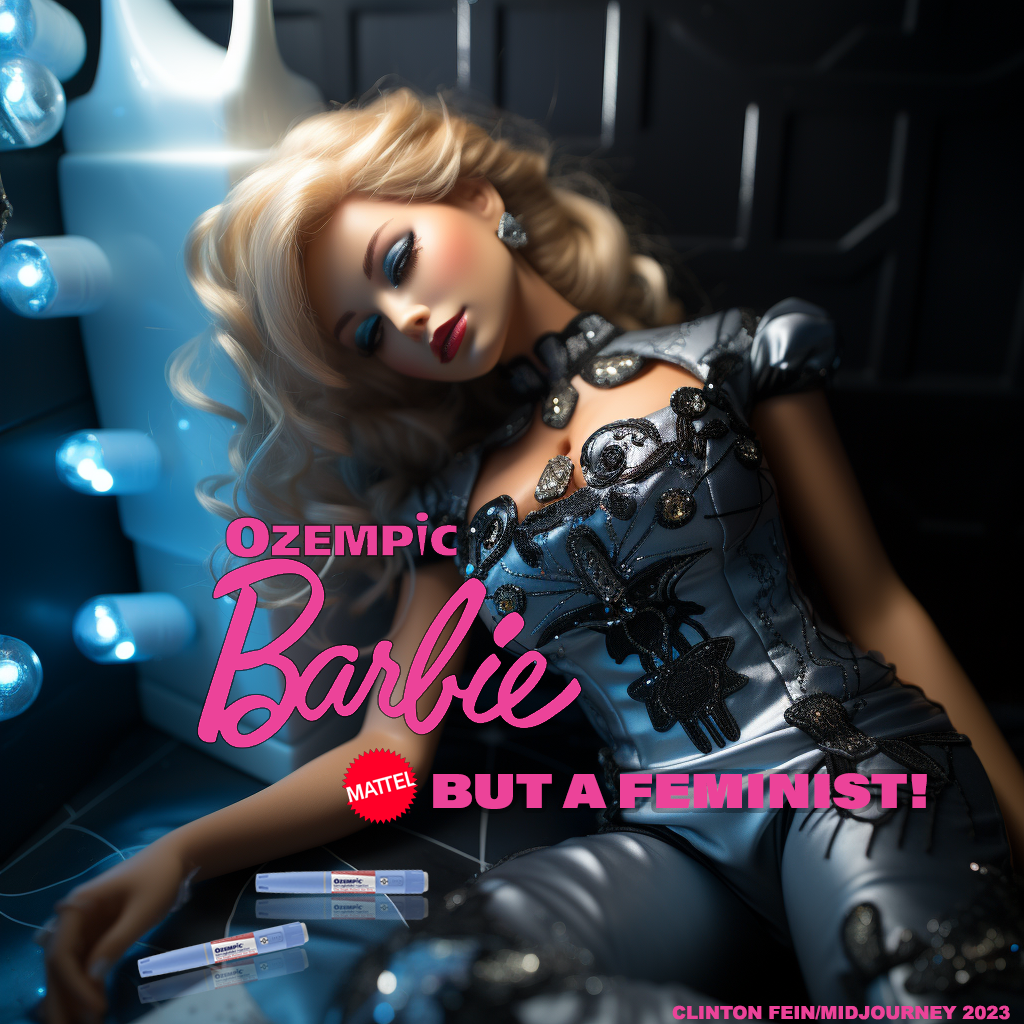
Barbie Bashing and Branding
Barbie Bashing in a Barbie World
“Am I the only person on Facebook to not give a fuck about an over-hyped movie about a bulimic doll?” I posted recently.
Until a good few feminists in my life told me how much I would love the Barbie movie. It’s subversive and smart, they said. It’s a big fuck you to the anti-woke, said others.
And because it was impossible to escape the marketing onslaught, I couldn’t help but notice how it had triggered whiny boy-men like Ben Shapiro to burn Barbie dolls on barbeques in effete fits of pique. Enough to make the likes of Andrew Tate stop in his steroid tracks and trafficking to condemn it. Piers Morgan possibly even stopped hysterically bitch slapping Meghan Markle for a minute to denounce it, although I haven’t sought nor seen him attempt to mansplain how terrible it is.
Fox News’s Laura Ingraham launched into a Ken-inspired tirade:
“They don’t want real men. I mean, they want pajama boys who sit around waiting for the government to send them a check, you know, as they get ready for their, you know, Pilates class in their, you know, leggings and wait for their next, you know, DoorDash order to come in. I mean … real men are a threat to them.”
She’s still waiting around for a real man or woman.
My resistance to seeing Barbie was threefold. Blind consumerism and an attachment to unbiodegradable plastic became outdated long before Greta Thunberg began triggering insecure men. But, as importantly, I remember the furor that arose in the early 90s when Mattel released a talking Teen Talk Barbie that complained about how tough math class was. Mattel copped to the “mistake’ after consumer groups went ballistic, but the cat was out of the bag. GI Joe dolls (or Action Man, which I owned as a kid in South Africa in the early 70s) would never have whined about math being difficult. Astronaut Barbie would need to ace math. The “Barbie Liberation Organization,” an underground network of creative activists, bought and swapped Teen Talk Barbies and G.I. Joe dolls’ voice boxes, and then returned the dolls to the shelves to be re-sold to the public.
Barbie can present as a woke feminist all she likes, I thought, but she’s still the poster child for pre-Instagram body dysmorphia, and the blonde, unblemished perfection of Margot Robbie does little to dispel that.
So, I deliberately sought out some voices I would be interested in hearing. What would Camille Paglia have to say? Unfortunately, she hasn’t opined yet, and the only Barbie reference I could find was her takedown of Taylor Swift’s highly publicized girl squad in a 2015 article for The Hollywood Reporter:
“In our wide-open modern era of independent careers, girl squads can help women advance if they avoid presenting a silly, regressive public image — as in the tittering, tongues-out mugging of Swift’s bear-hugging posse. Swift herself should retire that obnoxious Nazi Barbie routine of wheeling out friends and celebrities as performance props.”
Swift, seemingly following Paglia’s advice, did move on from that Nazi Barbie phase and instead turned the music industry on its head, becoming one of the most successful musicians ever. When record executive Scooter Braun, whom she claimed bullied her and refused to let her buy the masters of her first few albums, she raged, fumed, and plotted. In perhaps the biggest fuck you since Madonna released Justify My Love as a video single following its banning by MTV, Swift re-recorded her albums, sounding even better, outselling and devaluing the originals.
Before I could watch the Barbie movie, Sinéad O’Connor died.
Sinéad O’Conner was fundamentally the anti-Barbie. She eschewed conventional beauty standards, refusing to be trapped or defined by them, yet even in her rebellion, was defined by them regardless. Her record label told her to grow her hair, so she shaved it. She raged, cried, yelled, sang, and wore her heart so brazenly and openly on her sleeve that it terrified people. She was the yin and the yang. Her vulnerability was her strength, and her strength was fierce and unapologetic.
Ken’s admission that patriarchy is boring might have yielded the appropriate laughs –even Rebecca Solnit found Barbie’s take on patriarchy amusing — but Sinéad found no humor in patriarchy and recognized it as abusive and deadly. Long after she tore up a photo of John Paul II on Saturday Night Live, flagrant child abuse, shelter and protection of predators and priests, the condemnation of condoms to prevent HIV and AIDS, and anti-abortion fear-mongering surged unabated in the name of the Catholic Church. Bejeweled men sashaying around in satin frocks remain as puzzling a representation of the patriarchy as a makeup-caked, blonde, anorexic doll representing the new feminism.
As for Barbie embodying the ultimate Gloria Steinham-approved femme, lipstick feminist, it seems American views on feminism are as varied by political affiliation, age, and education as they are by gender.
If the Barbie movie triggered anxious incels like Ben Shapiro to freak out or Senator Ted Cruz to label it as “Chinese communist propaganda” without the benefit of actually seeing it, imagine how someone like Sinéad O’Connor must have elevated their blood pressure. Higher than the pitch of their voices, no doubt.
And so I relented. I watched the movie.
Who couldn’t relish every word America Ferrera lamented in her viral monologue about the challenges of being a woman? I could appreciate all the inside jokes, burns, and digs that empowered girls and women and drove insecure men crazy. The Barbie-inspired surge of break-ups amused me. I could also enjoy the meta paradoxes the movie both satirized and amplified.
And although I know I’m not the target demographic Barbie was intended to entertain, it ultimately left me feeling a little underwhelmed, if not slightly depressed.
Despite Mattel’s attempts at diversity, Hollywood still banks on white leads for their billion-dollar jackpots.
My core issues remain. Margot Robbie is basically JonBenet Ramsey, all grown up. Flawless, blonde, skinny, and white. As is Ryan Gosling’s Ken, waxed, plucked, tweezed, and tanned with his perfect nose and six-pack abs. (Never Kenough.) Our beauty ideals and standards are still impossible to live up to.
The pandemic did nothing to curb our voracious appetite to consume everything at all costs – if anything, it accelerated it. And discarded plastic Barbie dolls still pollute our oceans.
Our concerns over product placement seeping into content as subliminal advertising seem quaint now. The product is the content. And the content is the product.
Now, stand by for Barbie II, the AI sequel.
Select articles, news coverage and books from a plethora of publications covering Clinton Fein’s career as a technologist, activist, artist and speaker.
As an activist, with a Supreme Court victory over the Attorney General of the United States, Fein garnered international attention, including The New York Times, CNN and The Wall Street Journal.
Fein’s thought-provoking and controversial work as an artist caught the attention of prestigious educational institutions, including Harvard University, which recognized its socio-political relevance and ability to provoke crucial conversations about human rights, morality, and the boundaries of artistic expression.
